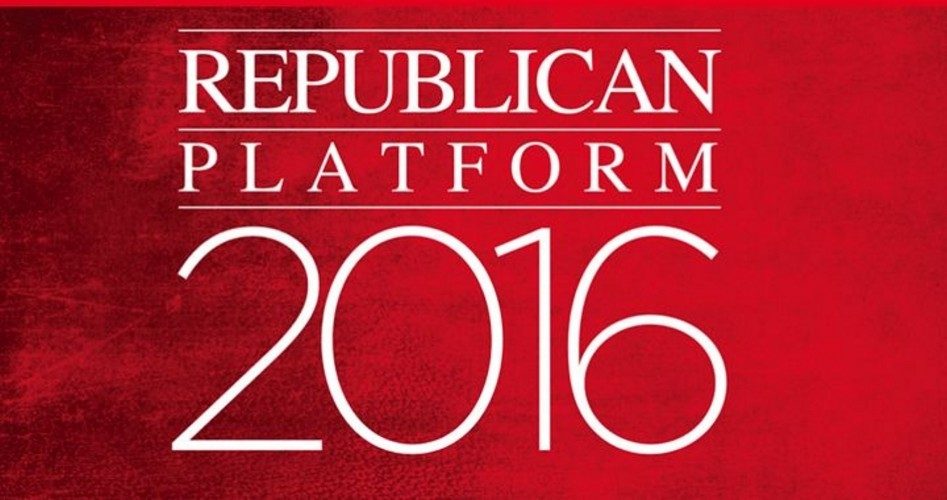
One common mistake people make when assessing the Republican Party is that it is a monolithic entity where all of its members walk in lockstep on key issues. This couldn’t be further from the truth as this past election cycle just revealed. I covered the Republican National Convention for The New American and, between listening to the various speeches and talking to the delegates, it was obvious to me that the Republican Party is splintering into two sharp factions that are diametrically opposed to one another. Donald Trump was the focus of everyone’s attention, but this ideological divide runs much deeper than Trump, and I believe it will impact the future direction of the party after Trump has moved on. The truth of the matter is that Trump merely tapped into this long simmering feud, some might even say accidentally, by choosing one side over the other, and completely upended the Grand Old Party in the process.
Globalists vs. Nationalists
The two major factions at play can best be described as “globalists” and “nationalists.” The first faction, which has represented the party establishment since at least the time of George H.W. Bush’s presidency, is the “globalist” wing of the GOP. (The Republican Party has had a strong globalist, Big Government wing since at least the early 1900s and “Progressive” Theodore Roosevelt.) The globalists are led by their intellectuals who are popularly known as neoconservatives. Globalists’ defining issues are support for the free migration of people between nations, which critics commonly decry as “open borders,” and international free trade agreements that centralize political control away from individual nations and toward supranational institutions. The neoconservative pundits who serve as mouthpieces in the media for the globalist faction also support an almost endless string of U.S. foreign military interventions, most of which have very little to do with American interests. While the neocons pay lip service to social issues, those issues are not a major concern of theirs, and the neoconservatives mainly use cultural arguments to shore up socially conservative voters behind their globalist candidates. The globalists’ major advantages in the struggle for the GOP are that they are very well-funded and have a majority of the media establishment on their side. The globalists’ major disadvantage, though, is that their views are not shared by the majority of their base. Indeed, their two key issues of open immigration and expanding free trade agreements are in complete opposition to the wishes of most Republicans. This means that globalists can win primaries only with the utilization of mass deception of their voters.
The other faction, which has existed since the end of the Cold War but has only now finally achieved success at the top of the ticket with the Trump campaign, is the “nationalist” wing of the GOP. The nationalist motto could be summed up simply as “America First,” which Trump has adopted as his secondary campaign slogan (after the much catchier “Make America Great Again”). Alabama Senator Jeff Sessions is the best example of a nationalist Republican holding elected office at the federal level. Unlike the neoconservatives in the globalist faction, nationalists’ ideology is driven by pragmatism. The nationalists’ stances don’t always line up with the U.S. Constitution, but usually do more often than those of neocons. The nationalists share the same views that Pat Buchanan expressed during his primary campaigns of the 1990s, and focus on achieving goals diametrically opposed to those of the globalists. Above all else, nationalists support restrictions on both trade and immigration, with the trade restrictions mainly meant to stop the “dumping” of goods in America by foreigners to destroy the viability of U.S. companies and to renegotiate or abandon trade treaties such as NAFTA that give preferential trade treatment to certain countries and companies, to the detriment of all others — including the United States as a whole.
Nationalists are also skeptical of foreign interventions, as well as any types of entangling international institutions such as NATO. This is not to say that nationalists are principled noninterventionists such as Ron Paul, though. Nationalists will act militarily when they believe doing so is in the best interests of America. Unlike Pat Buchanan, though, and perhaps as a reflection of current trends, the modern nationalist faction seems almost indifferent to cultural issues, such as homosexual “marriage” and abortion. Whereas Pat Buchanan was a devoted culture warrior, the current nationalists seem to be squarely focused on achieving their political goals.
The biggest advantage that nationalists have over the globalists is that their key positions are wildly popular with the majority of their party’s base. Opposition to both immigration and free trade agreements is something that a wide majority of Republican voters share. The nationalists’ biggest disadvantage is their relatively low media presence. With the exception of Lou Dobbs, there might not be a media pundit with a national audience who can be described as a nationalist.
Though nationalists have large online presence of self-described nationalists on social media, who are perhaps best represented by the alt-right, and there are a growing number of websites such as VDare.com and Breitbart.com that fit within the nationalist sphere, beyond that, the nationalists’ conventional media reach is limited. Their lack of a media presence really hurts them too when it comes to responding to the constant attacks they face when they are smeared by the mainstream media as “nativists” and “bigots.” Another major disadvantage the nationalists have is, to borrow a sports term, they have no bench. Besides Trump, who isn’t even a politician, and Senator Sessions, there are few if any other Republican nationalists. Senator Sessions is turning 70 years old this year, and there aren’t any candidates at the national level who could lead a campaign. There are some sitting congressmen who have begun reading the tea leaves of Trump’s success and started sounding a similar tune on trade and immigration, but there are hardly any that fit the description of full-blooded nationalists. Kansas Secretary of State Kris Kobach has shown potential but he has not moved up to national politics yet. There’s always a possibility that someone who is not an elected official now, such as Donald Trump, Jr., might eventually enter the political arena and emerge as a nationalist leader, but that remains to be seen.
Republicans Adrift
The constituencies in the Republican Party that don’t have a home fully in either of the aforementioned factions might possibly be the key to which faction will succeed in dominating the GOP of the future. Libertarians, constitutionalists, and social conservatives are really free-floaters in this factional divide. The faction that is best able to capitalize on the support of those voters should be able to garner enough support to win the party’s primary and lead the GOP on a national level.
Libertarians are mostly concerned with economic issues and support cutting regulations, taxes, and the entitlement system while also protecting civil liberties — namely getting rid of laws that they see as infringing on personal choices in the areas of sex, drug use, and abortion. Constitutionalists share much in the way of economic beliefs with libertarians, except that they usually base their ideological views on a strict constructionist understanding of the U.S. Constitution versus any free market dogma. Social conservatives are the “values voters” who mainly base their voting decisions on cultural issues and support candidates who make Christian moral teaching a focal point of their campaign.
The struggle that the globalists and nationalists will face in winning the support of these voters will be in overcoming any perceived negatives. Libertarians, for instance, might oppose the foreign policy of the globalists but also dislike the economic policy of the nationalists. Constitutionalists might find themselves frustrated by both factions’ lack of fidelity to the U.S. Constitution. Social conservatives, the unattached Republicans who have lost the most political power in the past three decades, now find themselves on the less-popular side of almost every cultural issue. Globalists and nationalists recognize that winning the support of social conservatives is mandatory in order to win the GOP primary but that going too far to win that segment of the party jeopardizes their chances in the general election. Ultimately, social conservatives might end up being disappointed by both factions, but the neoconservatives’ strong support for Israel, which is shared by many evangelicals, might be enough to give the edge to the globalists when push comes to shove.
The Future
So where do we go from here? Obviously, the outcome in November will be huge in terms of deciding which faction controls the party in the future. Charlie Sykes, a conservative radio talk-show host and prominent member of the NeverTrump movement, believes that Trump will lose and told The New American that “an awful lot depends on the margin of Trump’s defeat. How much of the Trump phenomenon was ideological? And how much [was] a reflection of a celebrity-driven cult of personality?” Sykes believes that “in any case, the GOP will have to undergo a serious period of introspection and sorting out. Is it going to be an inclusive, aspirational, optimistic movement that stresses opportunity, growth and freedom, or will it become a part of nationalism and race identity? If the latter, it is demographically doomed.”
On the flip side, the alt-right personality who uses the pseudonym Jazzhands McFeels, and hosts the popular pro-Trump podcast Fash the Nation, told The New American, “If Trump wins, you will see a complete transformation of the GOP unlike anything we’ve seen since perhaps the realignment of 1896. The party will become both more nationalist and populist, and neocons will either become extinct or will try to commandeer some portion of the Democratic Party.”
If Trump loses, McFeels told The New American, “There will be an ideological battle to take back control of the party. Guys like Jeb Bush, Mitt Romney, Paul Ryan, and Bill Kristol will attempt to re-assert themselves as the rightful torch-bearers of the party ideals, but they will fail. Now that the base has been awakened, it won’t be lulled back to sleep or convinced to support the old guard again. If new Trump-like candidates do not emerge to carry his banner (a very nice playbook has been written for them to do so rather easily), then the GOP will be relegated to catastrophic losses at the ballot box, as well they should.”
One potential scenario the globalists may attempt to bring into being is to dress up their future candidate in the cloak of diversity. This tactic was already employed by the political strategists behind Marco Rubio, whose presidential campaign slogan was “New American Century,” which itself was a play on the name of a think tank, the one responsible for the Iraq War. Rubio offered nothing but the same neoconservative positions of the failed George W. Bush administration, and as a matter of fact, Rubio and Bush were almost indistinguishable as politicians, except for the fact that Rubio had Cuban heritage.
There are plenty of candidates whom the globalists would love to use in the future to promote their “diversity” meme. South Carolina Governor Nikki Haley comes to mind as one whom globalists could use to recycle their neoconservative policies with a new multicultural face.
Another tactic that might be employed by the globalists is a tried-and-true one: push a more socially conservative candidate in the primaries to work as a spoiler for a nationalist candidate and draw enough votes in the primaries to prevent the nationalist candidate from beating the globalist candidate. This would be similar to both how Mike Huckabee in 2008 and Rick Santorum in 2012 garnered a large number of votes from social conservatives in the primaries but ultimately did not have nearly enough to prevent the party primary from going to the globalist candidates of McCain and Romney.
While no one can say with certainty who will win in November, the nationalists’ political options are fairly limited if Trump loses, but, even with a Trump loss, it’s unlikely the nationalists will fade away. The nationalists are definitely the David to the globalists’ Goliath, but there are rumors Trump might be looking into creating his own media network if he doesn’t win. If that comes to pass, it may offset the nationalists’ greatest disadvantage of a lack of media presence and change the dynamics in the future of this GOP factional divide.



